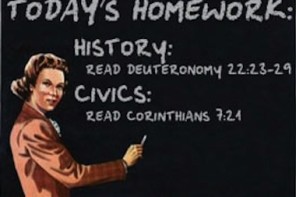All those earlier amendments you thought were extreme? They were nothing compared to these.
Gotta hand it to Don McLeroy. He certainly has the courage of his convictions. With the Texas Board of Education scheduled to vote on the revamped curricula this week, the board member certainly hasn’t been laying awake at night wondering if perhaps he and his fellow far-right conservatives might have gone a bit too far in some of the proposed social studies amendments — like, say, taking Thomas Jefferson out of class discussions of writings of the Enlightenment and replacing him with two theologians.
Nope. McLeroy must have been sleeping like a baby. Because last week the staunch conservative and young earth creationist has proposed a flurry of amendments including:
Having students contrast the Founding Fathers’ original intent related to the wording of the First Amendment’s freedom of religion clauses to the phrase “separation of church and state.”
McLeroy’s justification for proposing the measure, he writes, is to “stimulate critical thinking as to the actual wording in the First Amendment.” But of course, for literalists like McLeroy, the critical thinking ends at the discovery that nowhere in the Constitution does it say “separation of church and state.”
In addition to his 11th-hour attempt to require students to learn that the founders intended to create a theocracy, he has also proposed:
Putting increased emphasis on the studying of the Declaration of Independence “at the same level” as the Constitution.
As I’ve written before, the board’s conservative-voting bloc wants to equate the Declaration with the Constitution in order to foster the notion of American exceptionalism (God loves me more because I’m an American) and the idea that we are a Christian nation. The problem is that nowhere in the Constitution is God mentioned, but in the Declaration, Jefferson refers to a creator as well as “the laws of nature and nature’s God.”
In a discussion of civil rights, McLeroy wants to remove the 1948 case of Delgado v. Bastrop, which barred segregation of students of Mexican descent in Texas public schools, and replace it with the 2009 case of Ricci v. DeStafano, in which white firefighters sued over Connecticut hiring practices, and the 2005 case of Kelo v. City of New London, which dealt with government powers of eminent domain.
McLeroy also wants to downplay Progressive Era reforms and said reformers like Upton Sinclair, Susan B. Anthony, Ida B. Wells and W.E.B. DuBois as well as modern historians are “obsessed with oppression.”
Also, he wants students to “discuss alternatives regarding long term entitlements such as Social Security and Medicare, given the decreasing worker to retiree ratio.”
The board is scheduled to vote on these amendments this week as well as the whole kit-and-caboodle of previous curriculum revisions. Stay tuned. It should be an interesting week.




